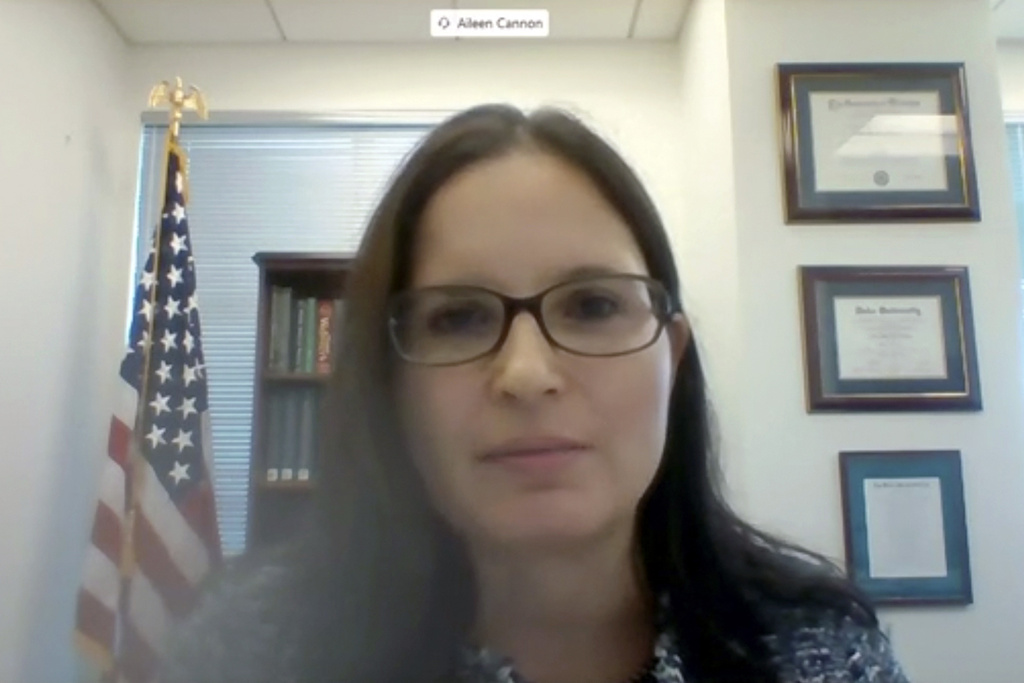
Former President Donald Trump’s four criminal cases have created an unprecedented legal gauntlet for him to run before voters have a chance to decide if he should return to the Oval Office. While Democrats cheer what they see as long-overdue accountability for the former president, some legal experts have expressed concerns that the cases — half are brought by partisan district attorneys, and the other half are overseen by the Biden Justice Department — are built on novel and unfair interpretations of the law. In this series, the Washington Examiner will take a look at the flaws that could unravel the cases against Trump. Part one explored the Fulton County case. Part two will look at the Florida case.
A straightforward indictment alleging former President Donald Trump hoarded national defense information in Florida has unraveled into a hurdle-plagued case with no clear end in sight.
The case has become rife with concerns of missteps on the part of special counsel Jack Smith, while Trump’s arguments that his charges should be dropped continue to weigh heavily as the court process plays out.
The judge has also done no favors for Smith, who has urged an expeditious prosecution at every turn. When the judge released a schedule this month, she not only left out a trial date but also pushed already-delayed deadlines out several weeks.
Below is a look at the case’s top issues.
Smith slip-ups
The case has become littered with complaints from Trump and his two co-defendants about Smith that threaten to upend it. Most recently, Smith’s team revealed it had jumbled items that might later be used as evidence.
The potential evidence was found during the FBI’s execution of a search warrant at Trump’s Mar-a-Lago residence in 2022. During the search, investigators gathered boxes full of documents, including some with classified markings, according to the indictment.
Prosecutors disclosed in court papers this month that although the investigators took great pains to make certain that documents were not moved from the boxes in which they were found, they did not always preserve the order of the documents within the boxes. They also admitted to misrepresenting the state of discovery to the court in previous statements despite maintaining that the order of the contents in boxes was insignificant.

Trump’s attorneys not only secured a delay in proceedings because of the revelation, but they also signaled they would not let the issue go. They warned they may file requests for Judge Aileen Cannon to sanction Smith “based on spoliation.” The sanctions could include more requests to dismiss the charges.
Walt Nauta, one of Trump’s co-defendants, was the first to notice the discovery issue, but before that, Nauta’s attorney also accused Smith’s team of impropriety on a different front.
Nauta’s attorney Stanley Woodward said in a court filing that Department of Justice prosecutor Jay Bratt made a veiled threat to him by referencing his pending judicial application during a meeting at DOJ headquarters in August 2022, long before Nauta was indicted.
Bratt, at the time, asked Woodward to have his client cooperate with the government on its investigation while wielding a folder of information about Woodward’s application for a judge position, Woodward claimed. Woodward described the moment as a stunning quid pro quo.
Prosecutors have disputed the account and said Woodward suspiciously did not raise the issue until months later, when he learned Nauta was the target of a grand jury investigation.
Jim Trusty, a lawyer of three decades who represented Trump in the classified documents case for a year, said he knew Woodward to be honest and that Bratt’s alleged behavior showed prosecutors had developed an “ends justify the means” mentality with Trump.
He told the Washington Examiner that Cannon could issue a ruling on the incident at some point and that there was also an easy opportunity to confirm what transpired.
“There’s a very logical exploration that should take place, which is you also make the Department of Justice turn over … any and all communications about that meeting,” Trusty said, noting others present at it could corroborate what happened.
Trusty, who used to work on organized crime at DOJ, said Woodward’s case was one example of how his former employer was practicing “lawfare” in Florida. Another example, he said, included the unprecedented search of the former president’s home at Mar-a-Lago. He said it appeared to be a fishing expedition based on the initially vague inventory list the FBI produced from it. He also observed how the National Archives and Records Administration in 2022 made a first-ever criminal referral of Trump to the DOJ in coordination with President Joe Biden’s White House.
“The more inventive these prosecutors are, the more hyper-aggressive they are, the more there’s a chance that at the trial level or at the appellate level or the Supreme Court level, that people smell a rat and they say, ‘This is not our criminal justice system,’” Trusty said.
Trump’s dismissal arguments
Trump has filed several requests for Cannon to dismiss his charges, and some remain pending.
In the pending requests, defense attorneys argued the prosecution has been “selective and vindictive,” that Smith was unlawfully appointed as special counsel, and that the charges “stem from” Trump’s official acts as president.
Cannon has yet to rule on these three motions and has scheduled hearings to examine them further, signaling she is seriously considering them.
While Cannon has already denied Trump’s two other requests for dismissal, she left open the possibility that Trump could raise those concerns again in the future.
In one of the denied requests, Trump made the argument that he and many of his allies, such as the conservative legal group America First Legal, have most forcefully pushed: that Trump was authorized to possess the documents in question as his personal property under the Presidential Records Act.
Cannon said in her order that the question of whether the PRA, a statute established in response to the Watergate scandal, protected Trump was premature and could resurface during trial.
Trump in his second denied request argued the allegations by Smith that he willfully retained national defense information in violation of the Espionage Act were “unconstitutionally vague.”
Cannon denied that request without prejudice, meaning Trump could also raise that argument again later in the case.
Judge’s pace
Cannon’s decision to keep the trial on hold indefinitely as she entertains many of Trump’s challenges and continues to grant his requests for extensions has bogged down the case.
Smith has repeatedly referenced his desire to move things along, citing the “Speedy Trial Act,” which gives defendants a right to a timely prosecution.
However, the special counsel was dealt his greatest blow to the timeline yet last week when Cannon, a Trump appointee, scrapped the original trial date of May 20 and declined to set a new one.

“Finalization of a trial date at this juncture — before resolution of the myriad and interconnected pre-trial and CIPA issues remaining and forthcoming — would be imprudent,” Cannon wrote in an order, citing court precedent.
CIPA refers to the Classified Information Procedures Act, which governs how plaintiffs and defendants handle classified evidence in a case. Adhering to CIPA requires adding several steps into the normal pretrial routine, inevitably lengthening the amount of time that will elapse before a trial.
Cannon first extended CIPA deadlines at the end of last year, and the initial trial date was never realistic after that. But her most recent scheduling order pushed deadlines out to July, added in new hearings, and included a warning that more delays could come.
When she does set a trial, it is possible at this stage that it could be after the presidential election, leaving open the possibility that Trump could win and then direct his attorney general to halt the prosecution or pardon himself.
Cannon’s approach has sparked the gamut of reactions, from praise to criticism to panic.
Trump’s supporters have found the judge to be refreshingly critical of prosecutors, unlike some of the judges presiding over other cases against him. His opponents have said Cannon is overly sympathetic toward the president who appointed her and that her pace is reflective of her lack of experience with cases involving classified documents.
National security attorney Bradley Moss believes Trump “hit the lottery” with Cannon.
CLICK HERE TO READ MORE FROM THE WASHINGTON EXAMINER
The pretrial process has taken “months longer than it should have for what is arguably the cleanest” of Trump’s four criminal cases, Moss told the Washington Examiner.
“On the substance, Judge Cannon has ruled against Mr. Trump time and again. The delay in reaching those decisions, however, is where her actions have played right into Mr. Trump’s larger strategy of avoiding facing trial before the election,” Moss said. “There is little the government can do about it.”






